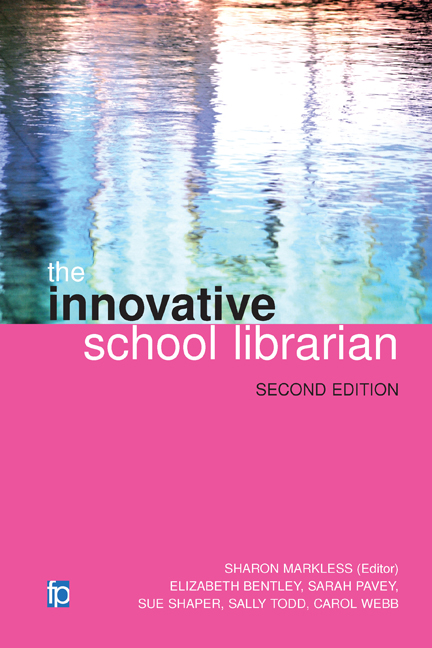Book contents
- Frontmatter
- Contents
- Preface
- Acknowledgements
- PART 1 WHO IS THE LIBRARIAN?
- PART 2 YOUR COMMUNITY: FROM PERCEPTIONS TO PRACTICE
- PART 3 MOVING FORWARD
- 7 Inspiration
- 8 Becoming integral to teaching and learning
- 9 Innovation
- Appendix 1 Levels of education
- Appendix 2 School library self-evaluation questions
- Appendix 3 An example of a completed self-evaluation summary sheet
- Appendix 4 SWOT analysis
- Appendix 5 Choosing priorities in development planning: sample grid
- Appendix 6 Example of a force field analysis: a tool for managing change
- Appendix 7 Managing change: process and principles
- References
- Index
9 - Innovation
from PART 3 - MOVING FORWARD
Published online by Cambridge University Press: 08 June 2018
- Frontmatter
- Contents
- Preface
- Acknowledgements
- PART 1 WHO IS THE LIBRARIAN?
- PART 2 YOUR COMMUNITY: FROM PERCEPTIONS TO PRACTICE
- PART 3 MOVING FORWARD
- 7 Inspiration
- 8 Becoming integral to teaching and learning
- 9 Innovation
- Appendix 1 Levels of education
- Appendix 2 School library self-evaluation questions
- Appendix 3 An example of a completed self-evaluation summary sheet
- Appendix 4 SWOT analysis
- Appendix 5 Choosing priorities in development planning: sample grid
- Appendix 6 Example of a force field analysis: a tool for managing change
- Appendix 7 Managing change: process and principles
- References
- Index
Summary
To innovate involves taking risks. Paradoxically this may happen most easily when people work in a safe and secure environment, one which encourages them to experiment in order to turn problems into opportunities. As librarians, many of us do not find ourselves in such a supportive situation, so why should we bother to invest energy, enthusiasm and hard work into something that might fail?
We may prefer to maintain the status quo rather than bring any extra stress on ourselves but, as we saw in Chapter 1, being professional involves looking continually for ways to improve our services. Just as a business cannot afford to stand still but needs to introduce new ideas and technologies to keep ahead of its competitors, so school librarians should not stagnate in the world of educational change and development. Furthermore, we all need intellectual stimulation to sustain our interest and innovating is a good way to keep us motivated and fresh.
Ross Todd (Todd, 2001) exhorts school librarians to re-conceptualize the role of the library, turning it from an information place into a knowledge-making space (see quotation at the end of Chapter 8). Using his three drivers for change: connections, actions and evidence, we will explore innovative practice for school librarians.
Connect
The pathways to innovation may open up to us through the contacts and relationships we make in our school, professional or wider communities. For instance, we may look at the leaders in our field and ask ourselves what is special about the librarians whom we admire. We can gain inspiration and insight from seeing how well they innovate and re-invent their roles (Taylor and Guiney, 2008); prizes for achievement such as the School Librarian of the Year Award in the UK help to draw attention to good practice (School Library Association, 2015b). It does not matter which model of professional practice we choose to follow as long as we continue to develop our ideas. The vignette below explains how it is possible to be innovative without necessarily being an extrovert.
At a meeting of local librarians there was discussion about raising profiles and professionalism, which evoked a lively debate. Sean told the group that he did not participate greatly in meetings at school, often leaving the discussion to others.
- Type
- Chapter
- Information
- The Innovative School Librarian , pp. 143 - 156Publisher: FacetPrint publication year: 2016



